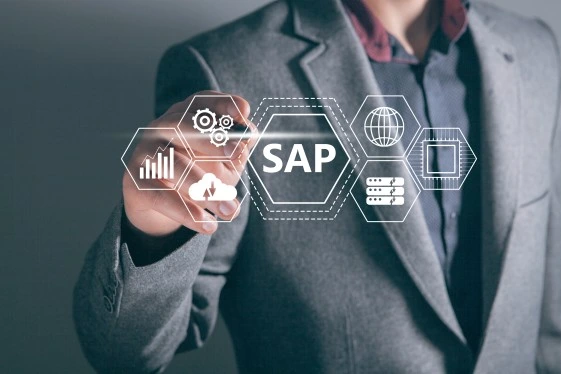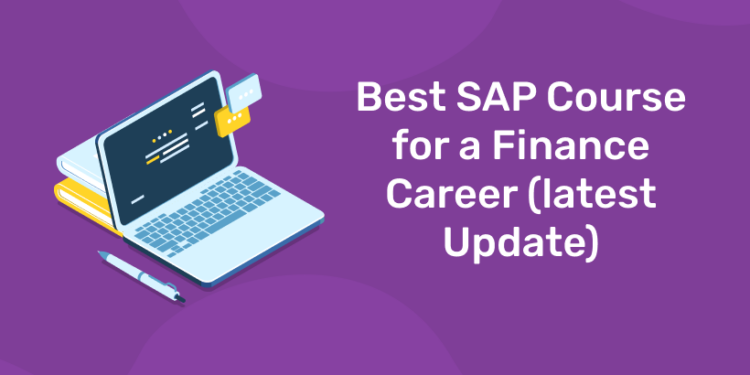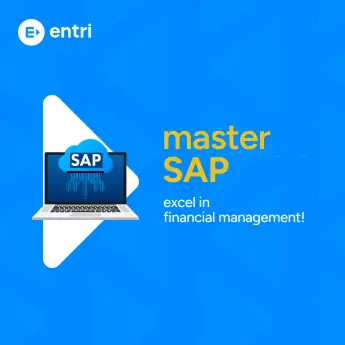Table of Contents
Key Takeaways:
-
SAP S/4HANA Finance (FICO) tops the list for finance careers in 2026, driven by mandatory ECC migrations by 2027.
-
Combines Financial Accounting (FI) and Controlling (CO) for seamless business-tech integration.
- SAP experts command premium salaries, with certified pros seeing 20 to 30% hikes amid AI-enhanced analytics demand.
- Powers 90% of large enterprises, ensuring job security in India’s booming IT-finance sector.
- Entri App’s SAP FICO course delivers hands-on S/4HANA training, mentorship, and placements for quick career launches.
Introduction
The world of finance is changing faster than ever. From automation and analytics to global compliance and real-time reporting, businesses need professionals who can keep up. That’s where SAP — the world’s leading Enterprise Resource Planning (ERP) software — comes in.
SAP dominates enterprise resource planning and it is evident with processing trillions in global transactions daily. For finance graduates or accountants, SAP FICO unlocks roles like consultant or analyst. This is undertaken by blending domain knowledge with ERP expertise. In 2026, S/4HANA’s real-time insights and cloud focus make it indispensable, especially after the upgrades done in 2025.
If you’ve ever handled accounting, managed budgets, or analyzed profits and losses, then SAP is the skill that can truly transform your career. Whether you’re an MBA graduate, a finance professional, or an aspiring analyst, mastering the right SAP course can open doors to high-paying, global roles that blend technology with financial expertise. Dive in to learn in detail about the best SAP course for boosting your finance career!
What is SAP and Why it Matters in Finance
SAP (Systems, Applications, and Products in Data Processing) helps companies connect all their business operations — from accounting to HR — under one powerful system. For finance professionals, SAP eliminates manual errors, automates accounting tasks, and offers real-time data insights that drive better decisions.
In 2026, SAP is at the center of digital finance transformation. Businesses are migrating to SAP S/4HANA Cloud, the latest ERP suite built for speed, mobility, and AI-driven intelligence. This transition has created a dramatic demand spike for trained finance experts with SAP certification.
Meaning Tip: SAP isn’t just software; it’s an entire ecosystem that keeps global corporations running efficiently. It’s the invisible engine behind major companies like Coca-Cola, Audi, Berger Paints, and Nestlé.
Why SAP S/4HANA Finance (FICO) is the Best Course for Finance Careers in 2026
Among the dozens of modules available, SAP S/4HANA Finance (FICO) remains the gold standard for finance professionals. It fuses real-time data analysis with advanced automation — everything a modern CFO or finance manager needs.
The FICO module combines Financial Accounting (FI) and Controlling (CO):
- FI (Financial Accounting) handles external financial statements, ledgers, accounts receivable, and accounts payable.
- CO (Controlling) focuses on internal cost tracking, profitability analysis, and budgeting.
What’s new in SAP FICO?
- Real-time ledger integration that cuts financial closing time by up to 75%.[1]
- Automation of compliance workflows using AI.
- Integration with cloud-based treasury and revenue modules for unified reporting.
Professionals with S/4HANA FICO skills are now considered essential assets in every digitally transforming organization.
SAP FICO manages core finance including FI for external reporting and CO for internal management. This enables predictive planning and compliance. Benefits include 75% faster processes, reduced month-end closes, and AI-driven fraud detection. Kerala finance pros gain edge primarily in Kochi’s S/4HANA hubs, with hybrid roles bridging traditional accounting and tech.
Master SAP with Expert-Led Courses
Unlock your potential with our comprehensive SAP courses! Learn essential modules like SAP MM (Materials Management), SAP SD (Sales and Distribution), and SAP FICO (Financial Accounting and Controlling) from industry experts.
Know MoreTop SAP Courses for Finance Professionals
While FICO remains the favourite, other SAP modules are equally powerful depending on your niche or specialization.
| SAP Course Module | Key Focus Area | Best For | Career Impact |
|---|---|---|---|
| SAP FICO (S/4HANA Finance) | Accounting, Budgeting, Controlling | Finance Graduates, Accountants | Core corporate finance roles |
| SAP BPC(Business Planning & Consolidation) | Forecasting, Budgeting, Consolidation | Financial Analysts, Controllers | Strategic planning and forecasting |
| SAP Central Finance | Multi-System Data Integration | ERP Consultants, Managers | Unified reporting for enterprises |
| SAP Treasury & Risk Management | Cash flow and liquidity tracking | Bankers, Treasury Managers | High-demand skill for BFSI |
| SAP Asset Accounting | Asset depreciation and valuations | Controllers, Accountants | Improved compliance with IFRS 15 |

Step-by-Step SAP Learning Path (Beginner to Expert, 2026 Edition)
Learning SAP, especially the S/4HANA Finance (FICO) module, becomes far more effective when you follow a clear and structured roadmap. Based on current 2026 syllabi from SAP Training and GTR Academy, here’s how to approach your SAP journey strategically.
1. Build Your Foundation
Start by understanding business accounting fundamentals and ERP basics. Familiarize yourself with terms like ledger, postings, profit center, and controlling area. Learn how an ERP system integrates multiple departments to produce a unified view of a company’s financial health.
Tip: Use SAP’s free Learning Journeys to understand FI (Financial Accounting) and CO (Controlling) structures before deep-diving into configurations.
2. Hands-on with SAP Interface
Get comfortable navigating the SAP GUI and Fiori interface. Learn how transaction codes work and how S/4HANA Cloud differs from traditional ECC versions.
3. Deep Dive into FICO Modules
Break the SAP FICO syllabus into learning chunks – as per the GTR Academy 2026 syllabus:
- General Ledger (FI-GL): Chart of Accounts, Journal Entries, Fiscal Year Variants.
- Accounts Payable/Receivable (FI-AP/AR): Vendor/Customer Management, Dunning, Payments.
- Asset Accounting (FI-AA): Asset Depreciation, Acquisitions, Retirement.
- Controlling (CO): Cost Centres, Profit Centres, Internal Orders, Profitability Analysis.
Project-Based Learning Tip: Try implementing small demo projects like setting up a new company code or automating a vendor payment process using SAP S/4HANA.
Join Entri’s SAP FICO Training Course today!!
4. Integrate Cross-Module Knowledge
Learn how FICO interacts with other SAP modules like MM (Materials Management) and SD (Sales & Distribution). This cross-functional understanding boosts employability.
5. Pursue Certification Preparation
Once you’re confident in FICO workflows, proceed to formal certification (see next section). Combine real-world project practice with SAP’s official training resources for the best results.
6. Gain Real-World Exposure
Internships, freelancing on small SAP setup projects, or sandbox simulations help bridge the gap between classroom knowledge and live projects.
Learning Outcome: By following this sequence, you evolve from an SAP learner to a job-ready professional proficient in S/4HANA Finance operations and real-world ERP integration.
SAP FICO Certification and Exam Details (2026 Update)
SAP Certification validates your capability to apply financial and controlling knowledge in business processes. According to SAP’s official learning hub and GTR Academy’s 2026 guide, there are three main certification levels — Associate, Professional, and Specialist.
1. Certification Overview
- Certification Name: SAP Certified Application Associate – S/4HANA for Financial Accounting Associates (C_TS4FI_2026)
- Exam Duration: 180 minutes
- Number of Questions: 80 (Multiple Choice)
- Passing Score: Around 60–65%
- Mode: Online (remote-proctored) or at SAP-authorized centers
- Exam Fee: Approx. USD 590–600
2. Required Skills and Focus Areas
Certification questions generally cover:
- General Ledger Accounting
- Accounts Payable/Receivable
- Asset Accounting
- Cost Center Accounting
- Financial Closing and Reporting
- Integration with other modules
Preparation Tip: Focus on real-world transaction scenarios, configuration setups, and financial closing procedures. Practice using mock tests on SAP’s Learning Hub or via SAP Education Partner Platforms.
3. Benefits of Certification
- Global Recognition: SAP certifications are globally accepted as proof of ERP excellence.
- Career Advantage: 2026 salary surveys indicate certified consultants earn 25–35% more than uncertified professionals.
- Faster Promotions: Certified learners often move into consulting, team lead, or ERP management roles sooner.
4. Post-Certification Path
Once certified, you can specialize further in Treasury Management, Central Finance, or S/4HANA Cloud Finance modules. The certification remains valid as long as you renew knowledge through SAP’s annual update exams.
Master SAP with Expert-Led Courses
Unlock your potential with our comprehensive SAP courses! Learn essential modules like SAP MM (Materials Management), SAP SD (Sales and Distribution), and SAP FICO (Financial Accounting and Controlling) from industry experts.
Know MoreCareer Opportunities After Learning SAP S/4HANA Finance
In 2026, more than 76% of Fortune 500 companies are built on SAP’s backbone. This means FICO-certified professionals are in demand worldwide across sectors such as IT, Banking, Healthcare, Manufacturing, Logistics, and Retail.
Job Roles You Can Aim For:
- SAP Finance Consultant
- ERP Implementation Specialist
- Business Process Analyst
- SAP S/4HANA Functional Consultant
- Financial Planning & Reporting Analyst
Real-world impact: Organizations using SAP report nearly 40% faster decision-making through real-time analytics and automation.
Updated Salary Overview (2026)
| Job Role | Average Salary (India) | Global Annual Range (USD) |
|---|---|---|
| SAP FICO Consultant | ₹8–12 LPA | $80,000–$110,000 |
| SAP Finance Analyst | ₹6–10 LPA | $70,000–$95,000 |
| SAP Functional Manager | ₹12–18 LPA | $110,000–$130,000 |
| SAP S/4HANA Expert | ₹10–15 LPA | $100,000–$125,000 |

Why Learning SAP is a Smart Career Move in 2026
- Global Relevance: SAP-certified professionals are needed across every major industry.
- Future-Ready Skills: SAP S/4HANA integrates AI, predictive analytics, and cloud tools — skills that future employers demand.
- High Job Security: ERP automation isn’t replacing jobs — it’s upgrading them.
- Multiple Career Paths: Expertise in FICO makes it easier to branch into MM (Materials Management), SD (Sales & Distribution), or Project Systems.
- Freelancing Freedom: SAP consultants often work independently, earning lucrative project incomes.
Tip: Adding SAP certification after your accounting degree or MBA can multiply your job opportunities globally within months.
Join Entri’s SAP FICO Training Course today!!
Future Outlook of SAP FICO (2026–2030)
The finance industry is undergoing a digital transformation, and SAP FICO is right at its center. According to LinkedIn 2026 Insights and SAP trend analyses, the next five years will redefine financial roles through automation, analytics, and integration technologies.
1. Rise of AI and Machine Learning in Finance
SAP S/4HANA now integrates AI-driven predictive analytics. These tools forecast cash flows, detect anomalies, and automate reconciliation — helping finance teams make faster, data-backed decisions.
2. Shift to Cloud-Based Implementations
By 2030, SAP S/4HANA Cloud will dominate deployments. Professionals who master cloud configuration, APIs, and integration tools will lead the ERP ecosystem.
3. Robotic Process Automation (RPA)
RPA is automating repetitive financial tasks such as vendor invoice creation, bank reconciliations, and closing tasks. SAP Intelligent RPA solutions are now part of core enterprise workflows, improving speed and accuracy.
4. Integration with Industry 4.0
With SAP connecting to IoT and digital manufacturing systems, finance is becoming a nerve center of corporate decision-making. Cross-disciplinary exposure will become crucial for consultants.
5. Continuous Learning & Micro-certification Trend
SAP professionals are now expected to keep reskilling steadily. Short certifications in areas like Fiori Apps, Cloud Analytics, and SAP BTP (Business Technology Platform) will enhance versatility.
Career Outlook: By 2030, the demand for SAP Finance experts is projected to grow by 20–25%. Professionals trained in S/4HANA Finance + AI automation skills will be the most employable across industries.
Why Choose Entri’s SAP FICO Course?
If you’re serious about starting a high-paying finance career powered by technology, Entri’s SAP FICO Training Course is designed for you.
Course Link:Join Entri SAP FICO Training
Features that set it apart:
- Real-time SAP lab access and case-based training
- Mastery of SAP FI (Financial Accounting) and CO (Controlling) under the S/4HANA environment
- Placement assistance through Entri’s corporate partnerships
- Expert mentors with SAP global certifications
- Flexible online learning with lifetime access
- Step-by-step project guidance and interview preparation
Learner outcome: Graduates often report landing SAP Finance or Analyst roles within 3–6 months of completion, with many doubling their salaries.
Conclusion
In the era of smart business and digital finance, learning SAP is no longer optional — it’s essential. The SAP S/4HANA Finance (FICO) module empowers you to work smarter, faster, and at a global level. With organizations constantly seeking skilled ERP professionals, there’s never been a better time to upskill.
Begin your journey today with Entri’s SAP FICO Course — a gateway to high-paying, globally recognized roles in finance and technology.
Start now, transform your career, and take command of your financial future.
Master SAP with Expert-Led Courses
Unlock your potential with our comprehensive SAP courses! Learn essential modules like SAP MM (Materials Management), SAP SD (Sales and Distribution), and SAP FICO (Financial Accounting and Controlling) from industry experts.
Know MoreFrequently Asked Questions
What is the best SAP course for a finance career?
One of the top SAP courses for a finance career is SAP S/4HANA Finance. It offers real-time analytics, advanced financial functionalities, and integrates financial accounting, reporting, and analytics within the SAP framework.
How does learning SAP S/4HANA Finance benefit a finance career?
Learning SAP S/4HANA Finance equips individuals with in-demand skills, such as proficiency in financial management, real-time data analysis, and decision-making. It enhances career prospects for roles like financial analyst or SAP consultant.
Are there specific modules within SAP S/4HANA Finance that are essential for finance professionals?
Yes, modules such as Financial Accounting (FI) and Controlling (CO) are integral in SAP S/4HANA Finance. These cover aspects like financial transactions, reporting, cost controlling, and budgeting, which are crucial for finance-related roles.
How frequently are SAP courses updated to reflect the latest industry trends and software features?
SAP regularly updates its courses to incorporate the latest industry practices and software advancements. Updates ensure that learners are acquainted with the most recent features and tools, keeping them relevant in the evolving finance industry.
Do SAP courses provide practical exercises or simulations for real-world application?
Yes, SAP courses often include practical exercises and simulations that mimic real-world scenarios. These activities help learners apply theoretical knowledge to practical situations, enhancing their understanding and skillset.
Can knowledge of SAP S/4HANA Finance be beneficial beyond finance roles?
Absolutely. Skills in SAP S/4HANA Finance, particularly in data analysis, reporting, and process optimization, can be valuable across various business functions, including supply chain management, sales, and operations.
How do SAP courses cater to learners with no prior SAP experience?
SAP courses usually offer introductory modules for beginners, providing fundamental knowledge of SAP software and gradually progressing to more advanced topics. These courses are structured to accommodate learners with varying levels of experience.
Are there any prerequisites for enrolling in SAP S/4HANA Finance courses?
While prior experience in finance or SAP could be beneficial, many introductory SAP courses don’t require specific prerequisites. However, having a basic understanding of finance or accounting principles might aid in comprehension.
Can SAP certifications obtained through these courses boost career opportunities?
Yes, SAP certifications validate expertise and can significantly enhance career opportunities. They demonstrate proficiency in specific SAP functionalities, making individuals more competitive in the job market.
Are SAP courses available online or in-person?
Both online and in-person SAP courses are available. Online courses offer flexibility in scheduling, while in-person training might provide more hands-on experience in a classroom setting.














